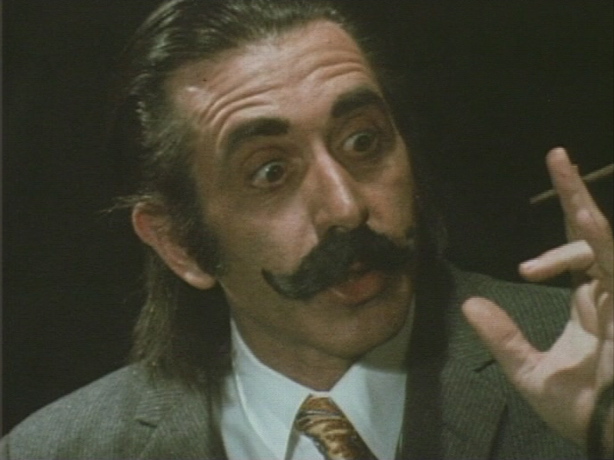Reviews
The Affairs of Janice (1976)
Forever in search of an outlet for his artistic creativity, the late “Zebedy Colt” – born Edward Earle Marsh on the cusp of the financially dire 1930s – led a life that was charmed in its own uniquely twisted way, fulfilling deeply personal ambitions that might not even occur to minds more conventional than his own. Occasionally working as a Hollywood extra to make ends meet, appearing as a slave boy in Cecil B. DeMille’s overblown The Ten Commandments, he belonged to that nowadays all but extinct breed affectionately known as the Broadway Gypsy whose living conditions frequently dipped below the poverty line, suffering nobly for their art, all else secondary to their treasured theatrical triumphs.
It would soon become apparent that Marsh was far more comfortable off Broadway than on, performing experimental plays and drag revues in some of the smaller venues and supper clubs. As an openly gay artist of considerable prowess, he wrote homo history when he recorded the album I’ll Sing for You at the twilight of the Sixties, containing his idiosyncratic renditions of torch songs traditionally sung by female vocalists, including Cole Porter’s world-weary lament Love for Sale and The Man I Love without the gender switch a more mainstream performer might have preferred. On this particular project, “Zebedy Colt” came into being as sort of an alter ego off-shoot whose blatantly in your face sexual persuasion gravitated him towards cinematic pornography which, at the time, existed more as a revolutionary concept and a logical extension of the counter-culture rather than the industry into which it was to evolve.
Soon tiring of the amateurish “qualities” of the budding film genre’s gay contingent, appearing in Ralph Ell’s justifiably obscure The American Adventures of Surelick Holmes, he would go on to prominently feature in a string of straight sex sagas, most notably Gerard Damiano’s magnificent Story of Joanna which ironically includes Colt’s most widely witnessed homosexual act as the obedient manservant obligingly performing fellatio on master Jamie Gillis. Truth be told, he rarely rose to the occasion (if you catch my drift…) in female company but he stood out as one of the finest actors ever in fornication films and one of its most idiosyncratic directors. Even back in the early Seventies, when porn was still proudly displaying its underground roots, Colt aggressively diverted from what was to become the norm, making up in both physical and psychological violence for what was lacking in production, as his artistic integrity forced him out of porn’s progressive mainstreaming. While less extreme, on the surface at least, than his outrageous Farmer’s Daughters or Unwilling Lovers, The Affairs of Janice provides a perfect place to start exploring the Colt body of work, lulling the audience into a false sense of security, only to seriously let it rip in the unforgettable final fifteen minutes.
Frugal funding by the notorious Leonard Kirtman (a/k/a “Leo De Leon” as well as “Leon Gucci”) takes its toll as the movie boasts a cheap look that goes against the comfortable milieu of artists and their wealthy patrons where the story supposedly takes place. One such patron is the profoundly conflicted George King, brilliantly portrayed by the director himself, miserably married to the shrewish Martha (Crystal Sync, star of Roberta Findlay’s excellent The Tiffany Minx, matching Colt’s searing intensity every step of the way) and fawning over his latest protégée, promising painter Janice. Blandly played by C.J. Laing, she’s a blank screen onto which other characters project their obsessional yearnings, her innocent “affairs” unwittingly unleashing tragedy. Lesbian lover to Martha, she’s ultimately more drawn to vapid but Greek god gorgeous model Kirk (a perfectly cast Ras Kean, the gumshoe hero of Armand Weston’s superlative Expose Me, Lovely), whose nice guy demeanor barely masks his more twisted tendencies, as evidenced by his rough ‘n’ tumble with Annie Sprinkle, culminating with one of her infrequent demonstrations of that sexual specialty that earned her this moniker, you know, “sprinkling” people with liquid love. Still, this does not make him a worthy adversary for the perverted George who, pushed right over the edge by all-consuming jealousy, invites Kirk to pose for a proposed triptych of Prometheus Ascending. Mere words can scarcely describe the direction this movie veers off into next…
Sexually solid if unadventurous until this point, except for Annie’s micturition, the movie too often seems to be biding its time before the outrageous conclusion, which throws it somewhat off balance in dramatic terms. The late Bobby Astyr uncharacteristically doesn’t bother giving much of a performance but, to be fair, he wasn’t given much of a part either as gay Little Joe (mmm…guess who’s being referenced here), one of the artist circle’s hangers on, “converted” by Annie in a scene jarringly played for laughs. Though her line readings are listless, Laing rather spectacularly scores in the sack, especially in a pulverizing poolside poke with Kean that turns into a scorching threesome when the seething Sync chimes in.
Directed and written by Zebedy Colt. Produced by Leonard Kirtman (as Leo De Leon) for Taurus Productions. Photographed by Sam Cosgrove. Edited by Steven Edwards. Starring C.J. Laing (Janice), Zebedy Colt (George King), Crystal Sync (as Crystal Harris) (Martha King), Ras Kean (Kirk Lansing), Annie Sprinkle (Susan) & Bobby Astyr (Little Joe). Running time : 72 minutes.

Undoubtedly the most unique auteur adult has ever known : the one and only Zebedy Colt
By Dries Vermeulen
